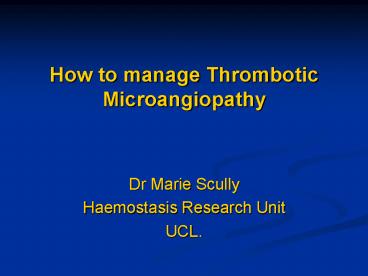How to manage Thrombotic Microangiopathy - PowerPoint PPT Presentation
1 / 27
Title:
How to manage Thrombotic Microangiopathy
Description:
How to manage Thrombotic Microangiopathy Dr Marie Scully Haemostasis Research Unit UCL. What is Thrombotic Thrombocytopenic Purpura? (TTP) Rare: 4-6/million Female ... – PowerPoint PPT presentation
Number of Views:980
Avg rating:3.0/5.0
Title: How to manage Thrombotic Microangiopathy
1
How to manage Thrombotic Microangiopathy
- Dr Marie Scully
- Haemostasis Research Unit
- UCL.
2
What is Thrombotic Thrombocytopenic Purpura? (TTP)
- Rare 4-6/million
- Female 70 cases.
- Peak incidence 4th decade
- Acute, life threatening disorder
- gt70 cases-idiopathic
- Antibody to ADAMTS 13 detected in 90 of Acquired
cases. - IgG primarily, IgM/IgA described.
- Mortality 15-20 ? Morbidity
3
Features of TTP
- Microangiopathic Haemolytic Anaemia
- Thrombocytopenia
- X-Neurological symptoms
- X-Renal impairment
- X-Fever
4
Subtypes of TTP
- Primary
- Congenital
- Acquired idiopathic (autoimmune) Acute
- Relapsing
- Secondary
- Infections HIV, E.Coli
- Pregnancy
- Drugs COCP, Ticlodipine, quinine, interferon,
simvastatin, CSA - Autoimmune disease
- BMT
- Malignancy
5
Can ADAMTS 13 differentiate between TTP HUS?
- YES (usually)
- Pathology TTP- platelet and VWF.
- HUS-Fibrin rich
- TTP-multisystem, HUS-local
- Normal ADAMTS 13 in HUS
- Veyradier J Paeds 2003
- HUS (D) (D-)
6
AUTOPSY CASES
Hosler et al Arch Path Lab Med 2003
7
AUTOPSY CASES
Hosler et al Arch Path Lab Med 2003
8
Management of HUS
- meticulous fluid/electrolyte balance and BP
control - renal dialysis as required
- FFP infusions OR therapeutic plasma exchange DOES
NOT improve outcome (Grade C, level IV) - anti-thrombotic or anti-platelet agents not
helpful
9
Congenital TTP
- Onset between birth and 4 years
- MaleFemale
- Rarely shows full pentad of classical symptoms
- All have thrombocytopenia
- Haemolytic anaemia common
10
Allford , BJH, 2002
11
HIV associated TTP
- ADAMTS 13 lt5-50. No Inhibitor
- All Heterosexual Africans (8 F1M)
- 5/9 presenting feature of HIV
- HAART therapy started ASAP
- CD 4 counts 170 (range 70-400) cells/µl
- Median viral load 74,400 copies/ml.
- Median 8 PEX (range 3-16)
- All normal ADAMTS 13 activity on follow up
- Follow-up 6-74 months.
- Miller, Int J STD AIDS, 2005
12
Pregnancy associated TMA
- TTP- ? 2nd Trimester
- HELLP/Pre-eclampsia-3rd Trimester-
- Reduced ADAMTS 13 activity-31(12-43).
- No Inhibitors.
- High vWFag.
- No ULvWF multimers
- HUS- 90 post partum
13
TMA in Bone Marrow transplantation
- TMA is not a specific disease entity
- George et al BMT 2004-35 autopsy reports from 35
patients after Allo-SCT, NONE had microthrombi
characteristic of TMA. 19 had infection as a
common cause of death. - Median incidence 8 post Allo SCT. Rare in
autos - Median time 46 days post transplantation
- Risk Factors
- MUD /- TBI
- acute GVHD gtGrade II
- CSA/Tacrolimus-Further increased if given
steroids - VOD
- infection-esp. CMV
14
TMA in BMT
- Normal ADAMTS 13 activity and no inhibitors
- Disturbances in endothelial function.
- Treatment discontinue offending drug
- ? Defibrotide
- ? Role for PEX
- Mortality 31-70, TMA attributable mortality
13-23
15
TMA and solid organ transplant
- Usually HUS, primarily post Renal transplant
- Incidence of TMA in Renal transplants 5.6
episodes /1000 person-years - Risk is greatest in the first 3 months post
transplantation - Usually 20 to immunosuppressives. Also-viral
infections, GVHD and rejection - Pathogenesis endothelial cell dysfunction.
- No evidence for PEX
- Patient survival 50 at 3 years
16
Treatment of acute TTP
Survival of patients with thrombotic
thrombocytopenic purpura
Rock et al, 1991
17
Treatment of acute TTP
- 2nd Line therapy
- change plasma type/frequency or volume of PEX
- Vincristine
- 3rd Line therapy
- Cyclosporine
- Cyclophosphamide,
- Defibrotide
- Splenectomy
18
Time to platelet count recovery plasma volumes
used in acute TTP with and without anti ADAMTS
13 antibodies
Group 1 No antibody Group 2 Antibody
present
Coppo et al BJH 2006
19
RITUXIMAB in TTP
- Anti-CD 20 chimeric monoclonal antibody
- acts on B-lymphocytes
- Used in
- acute refractory / acute relapsing TTP
- electively in patients with IgG antibodies to
ADAMTS 13 - 375mg/m2 IV
- after PEX in acute TTP
- Weekly therapy
- Give 4-8 treatments
- monitored via ADAMTS 13 activity IgG antibody
to ADAMTS 13
20
Effect of Rituximab in acute refractory TTP
21
Acute and elective use of Rituximab
ADAMTS 13 activity
IgG antibodies to ADAMTS 13
Rituximab
Admission
X 4
X 4
22
Platelet count Pre Rituximab Therapy
23
ADAMTS 13 activity and IgG antibody to ADAMTS 13
before and 3 months following Rituximab
Anti-IgG antibodies to ADAMTS 13
ADAMTS 13 activity
24
CD 19 levels before and following Rituximab in
acute TTP
CD 19 ()
25
Rituximab improves Response Rate and PFS in
Relapsed/refractory TTP
Heidel, TH 2007
26
In Conclusion
- ADAMTS 13 lt5 appears specific for acute acquired
and congenital TTP - Role of antibodie(s) to ADAMTS 13
- PEX remains the mainstay of treatment
- Targeted therapy related to subtype
- The future
- ? Recombinant ADAMTS 13
- ? Monoclonal antibody therapy
27































